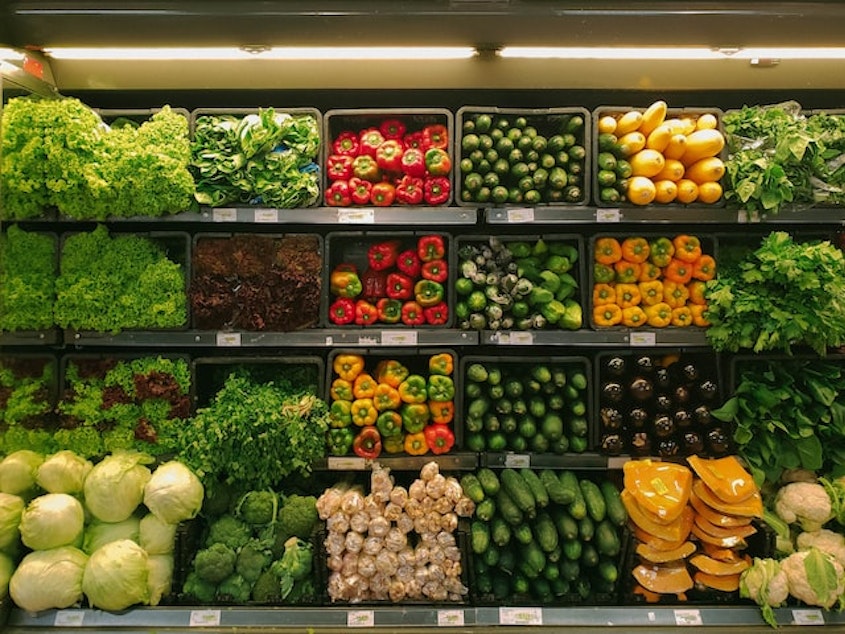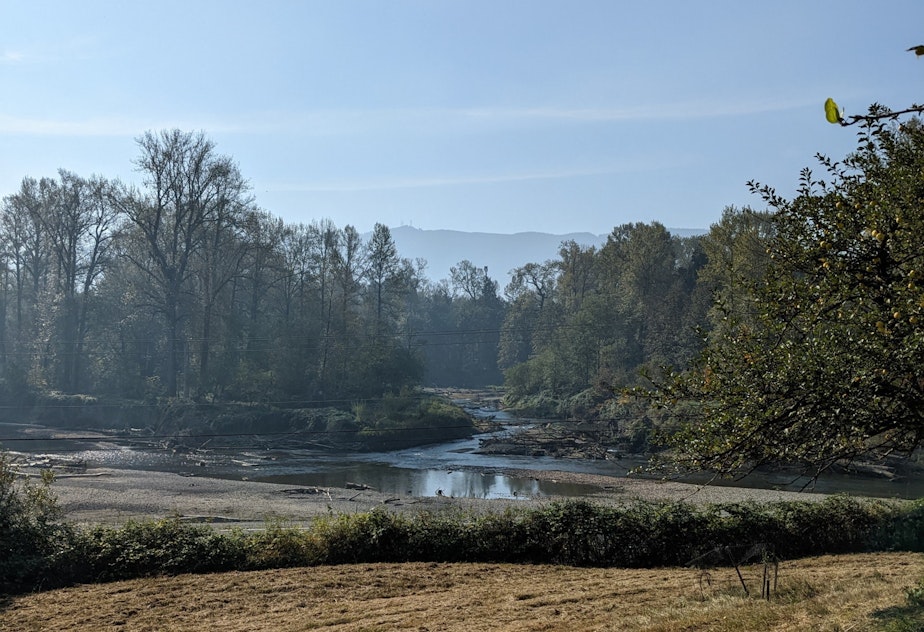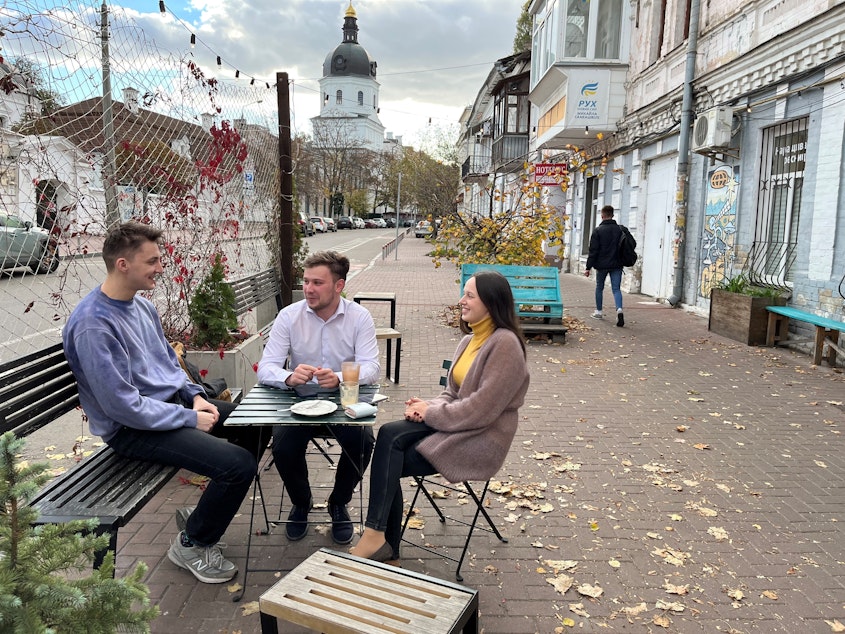The rise of Krogersons: Today So Far

Two big grocery companies, with stores throughout Western Washington, aim to merge. What that could mean for the region's grocery options.
This post originally appeared in KUOW's Today So Far newsletter for October 19, 2022.
Grocery companies Kroger and Albertsons aim to merge. Now, this is one of those business and economic stories that comes across as boring to a lot of folks. But it's one you should care about, or at least keep an eye on where you shop.
There's a reason I don't regularly shop at Whole Foods, PCC, or Metropolitan Market. Nothing against their food; I just don't feel like taking out a loan just to afford their prices. On the other end of the spectrum, I've never relied on Costco because there's no way I'll ever eat that much broccoli. Avoiding luxury grocery stores means your options are places like Fred Meyer, Safeway, Albertsons, or QFC. Kroger owns Freddys and QFC. Albertsons owns Safeway.
It seems these two companies are set on joining forces. Kroger would get access to communities it currently doesn't (and Albertsons does) and vice versa. Krogersons (my name for them) would measure up against their giant competitor Walmart. Also, the chains could up their online-shopping game. When it comes to our region, however, these companies operate more than half of all the grocery stores that our households rely on, The Seattle Times reports. It is understandable that Krogersons' market influence would make folks around Western Washington a bit wary.
A merger like this generally means there are going to be store closures, as Seattle Times reporter Paul Roberts told Seattle Now this morning. For example, when Albertsons purchased Safeway in 2014, the company ended up with both stores across the street from each other in Poulsbo. Today, Poulsbo has kept its Safeway and Albertsons closed.
"We have to assume that Kroger and Albertsons haven't gotten this far without coming up with a list of stores they think they'll have to divest," Roberts said. "I think we can assume that, given the Seattle area in particular has an unusually high concentration of Safeway's and Kroger stores, that there's gonna be a fair amount of divestiture happening here."
Sponsored
That is making the local grocery workers' union nervous.
"There is strong worry that a massive merger at this scale would threaten thousands of jobs of workers across the region," said Tom Geiger with UFCW 3000, a union that represents 50,000 workers in Washington state. "It would also, we believe, threaten their pensions, the wages and other benefits of workers that continue to work in those stores. And we feel it would threaten the competition in the grocery market and negatively impact grocery store shoppers, as well, who might see higher prices and less product availability across their community."
Kroger's digital sales are growing in excess of 100%, and its most recent profits aren't looking to shabby either. Albertsons has its own good numbers to report. All this has come during a time when pandemic woes have hit other parts of the economy hard and inflation has driven prices higher. The Wall Street Journal reported in October 2021 that some grocery store companies have attempted to protect consumers from rising costs, but that hasn't been the case for companies like Kroger. In fact, Kroger finance chief Gary Millerchip is quoted: "We’ve been very comfortable with our ability to pass on the increases that we’ve seen at this point. And we would expect that to continue to be the case.”
To be fair, Millerchip made similar comments at an earnings meeting in September 2021, where he commented that some cost hikes are being passed to the customer, while others are not.
And that brings us back to the wariness around food deserts. Stores could close, and price competition could go down. If we have the option, we know to go to different stores for better prices. Personally, I head to Safeway for frozen veggies, H Mart for fresh veggies and fish, Freddys for other options, and QFC if I'm in a pinch (or for that massive booze selection in University Village). This merger would mean my options would dwindle to Krogersons and H Mart.
Sponsored
As Roberts puts it, "That middle ground is becoming harder and harder to play in."
"The paradox here is that ... who is the company that can come in and buy these divested stores and compete with the merged company, that can somehow stand up against the merged Kroger and Albertsons?"
What's your grocery strategy around town? I'd love to hear your tips. Email me at dyer@kuow.org.
Listen to Roberts' full conversation with Seattle Now here.
AS SEEN ON KUOW
Sponsored

Usually, during this time of year, water would be rushing through this bend in the Snoqualmie River, and gushing over Snoqualmie Falls. But the ongoing warm and dry conditions this October have left the waterway quite low. Snoqualmie Falls is a mere trickle of itself. That means a lot of disappointing, and rocky, rides for inner tubers aiming to float the river. It also means a tough time for salmon attempting to spawn. (Courtesy of Mary and Joe Norton)
DID YOU KNOW?
As we talk about the merger between Kroger and Albertsons, it's interesting to note that many of these stores we're talking about are homegrown Northwest companies.
Fred Meyer started in Portland, Oregon in 1922. It merged with Ohio-based Kroger in 1998.
Sponsored
Albertsons started in Boise, Idaho in 1939. Safeway started in 1915 in American Falls, Idaho. Albertsons purchased Safeway in 2014. The founder of QFC, Jack Croco, got his start in the grocery business at a Boise Albertsons, and helped that chain break into the Seattle area. He soon started his own grocery store in the 1950s, which became Bellevue-based QFC. The very first QFC-branded store was in Seattle's Roosevelt's neighborhood (that site is now an apartment building / light rail station).
With the proposed merger between Kroger and Albertsons, all these stores with Northwest histories would come under the same umbrella.
ALSO ON OUR MINDS

Sponsored
Plugged-in Ukrainians are keeping a close eye on next month's U.S. midterm elections. The likelihood that Republicans will take control of the House has triggered concerns about long-term support for the war effort.

